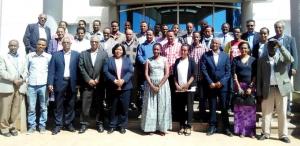Hospital Managers Training
The tenets of the Universal Health Coverage (UHC) and the Sustainable Development Goals (SDGs) underscore the critical nature of having mechanisms to ensure effective health facility management strategies and systems to assure quality of service. It is in line with these objectives that the training of the hospital managers was conducted, following the training needs assessment in September 2017. From this assessment, 17 topics were selected that were deemed as high priority.
The training was held from 30th October to 10th November, 2017 at Orrota National Referral Hospital Conference Hall. The facilitators were international (WHO-AFRO) and local experts, from institution for excellence of organizations, line ministries, and WHO country office. The team carried out extensive incorporation and adaption of materials to the country context, previous to the training.
After the ceremony was opened, Mr. Semere gave an opening remark on behalf of WHO representative, which was followed by the director general, Mr. Berhane’s opening remark. This was followed by the objectives and expected outcomes of the training workshop, which was to enhance the managerial skills for effective and efficient running of a hospital and to improve quality of care. Participant expectations were discussed, ground rules brainstormed from the participants and pre-test carried out. The scene was set by elaborating how this training and capacity building was linked to the strategic plan (HSSDPII). As roadmap was a planned activity to be built up on daily, an introduction was given to highlight the importance and expectation of this assignment.
A vast array of skills were covered in the training including: Leadership; Planning; Systems thinking; Resource management; Ethics and code of conduct; Community involvement; Program and project management; Client centeredness; Quality management; Managing change;
Emergency preparedness and Supportive supervision.
The methodology of the training was variety, including presentations, plenary sessions, group work, panel discussion and practical application of skills through field work activities. The field work was carried out after all topics were covered (day 8 of the training). Five core areas were picked from the trained topics and assigned to five groups, which then went to the allocated hospital site to assess. The groups were given formulated questionnaire, specific to the topic, to serve as a baseline for information gathering. The findings were then presented the next day, and it was evident that the participants have internalized the fundamentals skills and knowledge shared from the workshop.
Furthermore, the participants were tasked to work on their hospital’s road map daily, to integrate all the components taught in the workshop and to propose solutions or changes. Three participants were randomly selected and they presented their roadmaps, which depicted the critical thinking behind problem identification, analysis, and planning, in alignment with improving the general quality of care and services.
The participant’s evaluation of the training highlighted that it was a success, fruitful and practical skills and topics were thought, and they appreciated that different approach was taken in terms of the teaching method as well as the topics, as it was expressed that heavy focus is normally placed in clinical training but not managerial training, such as this.
The ceremony was officially closed by Director General Berhane, who expressed gratitude to everyone involved, especially the facilitators, and the participants, who were very dedicated and committed, with 100% attendance rate. Moreover, he emphasized how he is looking forward to witness the practical changes and improvements at the hospitals.
For more information, please contact:
Technical : Dr. Theodros Tekeste, Mobile: +291 7438181, Email: tekestet [at] who.int (tekestet[at]who[dot]int)
Communications: Mrs Selam Berhane, Mobile: +2917265433, Email: Berhanes [at] who.int (Berhanes[at]who[dot]int)



